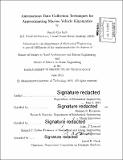Autonomous data collection techniques for approximating marine vehicle kinematics
Author(s)
Gerlach, Jacob
DownloadFull printable version (7.620Mb)
Other Contributors
Massachusetts Institute of Technology. Department of Mechanical Engineering.
Advisor
Michael R. Benjamin and John J. Leonard.
Terms of use
Metadata
Show full item recordAbstract
Understanding vehicle kinematics is essential in allowing autonomous guidance algorithms to accurately assess short range encounters. Low cost, reconfigurable autonomous vehicles motivate using in-field online techniques rather than tow tank testing or Computational Fluid Dynamics (CFD). While the parameters of many physical dynamic models can be obtained using System Identification (SI) techniques, these models require knowledge of the vehicle actuators, which may not be the case in a "backseat driver" architecture using payload autonomy. Even when an identified physical model is available, using it to simulate trajectories requires insight into the design of the relevant controller, which may be proprietary or otherwise unknown to the back seat. This thesis develops a data collection procedure to obtain empirical kinematic trajectories for unmanned surface vehicles (USVs). A linear black box model of the USV yaw system is also developed, using only data available in the backseat. A prediction table for the M200 USV is developed with both techniques.
Description
Thesis: S.M. in Naval Architecture and Marine Engineering, and S.M. in Ocean Engineering, Massachusetts Institute of Technology, Department of Mechanical Engineering, 2015. Cataloged from PDF version of thesis. Includes bibliographical references (pages 75-77).
Date issued
2015Department
Massachusetts Institute of Technology. Department of Mechanical EngineeringPublisher
Massachusetts Institute of Technology
Keywords
Mechanical Engineering.